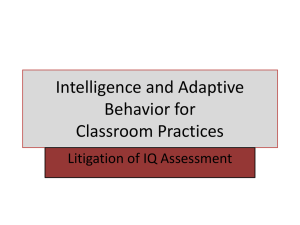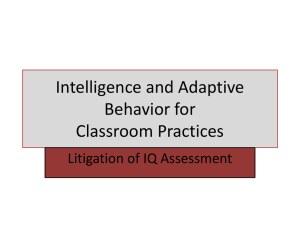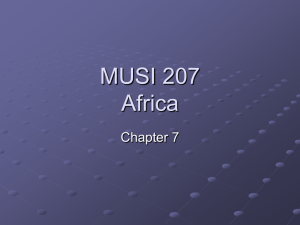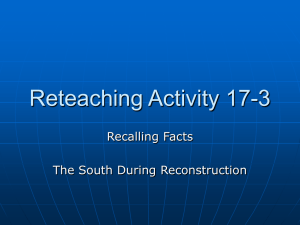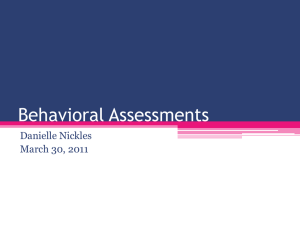Intelligence Assessment and Litigation of IQ
advertisement
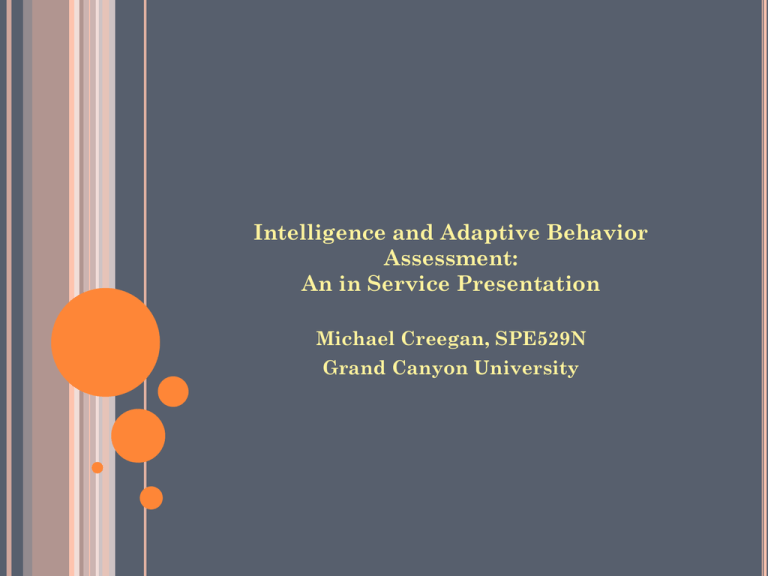
Intelligence and Adaptive Behavior Assessment: An in Service Presentation Michael Creegan, SPE529N Grand Canyon University INTELLIGENCE ASSESSMENT Intelligence assessment is a necessity in the realm of special education. Intelligence assessment is used in the diagnosis of a suspected disability process, and is considered when identifying an appropriate placement. Examples of Intelligence Assessment Wechsler Intelligence Scale for Children Kaufman Assessment Battery for Children (http://www.extremeintellect.com/ei2007/IQ/IQtestlist.html) ADAPTIVE BEHAVIOR ASSESSMENT Adaptive behavior assessment systems (ABAS) are used as a comprehensive measure of an individual on a “adaptive behavioral scale”. ABAS measure functional behaviors that students will need in everyday adult life. Examples of ABAS Adaptive Behavioral Assessment System-II Adaptive Behavior Evaluation Scale Adaptive Behavior Inventory for Children (ABIC) (http://www.assessmentpsychology.com/spedtests4.htm) APPLICATION IN THE CLASSROOM Both intelligence assessment and adaptive behavioral assessments are important to, and highly applicable to, classroom instruction. Intelligence Assessment Identify disability Define appropriate placement Adapt instruction Adaptive Behavioral Assessment Outline behavioral goals Provide individual behavioral supports to learners LEGAL APPLICATIONS OF IQ ASSESSMENT While IQ assessment is necessary in the classroom environment, there are many instances of IQ assessment have significance in court cases as well. Examples of IQ Assessment Litigation Ferguson v. Massanari Roelandt v. Apfel Larry P v. Riles (http://depts.washington.edu/fadu/legalissues/ss.fedcourt.html) LARRY P V. RILES Larry P v. Riles is a 1971 federal court case that dealt with the issue of over representation and test bias. Outline of Larry P v. Riles 6 African American students claimed an inappropriate educational placement Plaintiffs believed IQ test was racially biased Disproportionate amount of African Americans enrolled in special education services, specifically Educable Mentally Retarded (EMR) Demanded a reevaluation of placement and diagnosis practices (Larry P, n.d.) PARTIES INVOLVED Larry P v. Riles involves the San Francisco Unified School District (Defendants) and 6 African American students placed in an EMR classroom (Plaintiffs). Plaintiffs 6 African American students claiming misdiagnosis Defendants State and city superintendants and Board of Education members representing the San Francisco United School Districts (Larry P, n.d.) REASONS FOR THE CASE The case of Larry P v Riles was brought before the federal court because the plaintiffs felt that they were inappropriately diagnoses and placed in special education services The plaintiffs argued that the IQ tests used to assess them were biased against African Americans and have lead to a disproportionate amount of African Americans receiving special education services in the San Francisco United School Districts (Larry P, n.d.) MAIN POINTS OF DISAGREEMENT Plaintiff Argument Inappropriate EMR diagnosis and placement of plaintiffs IQ test bias leading to overrepresentation of African Americans Defendant Argument School district employs a number of Mental Retardation classifications to ensure accurate placement(EMR, TMR, ect…) Plaintiffs not an accurate representation of the African American population receiving special education services IQ testing holds both validity and reliability Students not receiving the most appropriate education (Larry P, n.d.) OUTCOME OF LITIGATIONS The court of appeals found that… The plaintiffs were inappropriately diagnosed EMR The 6 African American students as plaintiffs were an appropriate representation of the whole of African American students receiving special education services as EMR IQ tests did exhibit a cultural bias California could no longer solely administer IQ tests to African Americans to diagnose EMR (Larry P, n.d.) Implications on Special Education Schools no longer solely administer IQ tests for the diagnosis of a suspected disability. Students are now subjected to a diverse array of assessments including psychological evaluations and response to intervention (RTI) Standardized testing is now more closely scrutinized Standardized testing must now be conducted in the language that will wield the most effective results for that student Reflecting on Assessment and Litigation While IQ testing is still commonly used in school districts, a more diverse range of assessments is now employed. RIT and psychological evaluations are common practices for diagnosis and appropriate placement. Impact on Instruction Appropriate placements Appropriate assessments used in the classroom(ABAS) More effective education REFERENCES Larry P v. Riles. (n.d.) Retrieved April 2, 2010 From: http://www.uwyo.edu/wind/edec5250/assignments/Larry.pdf
